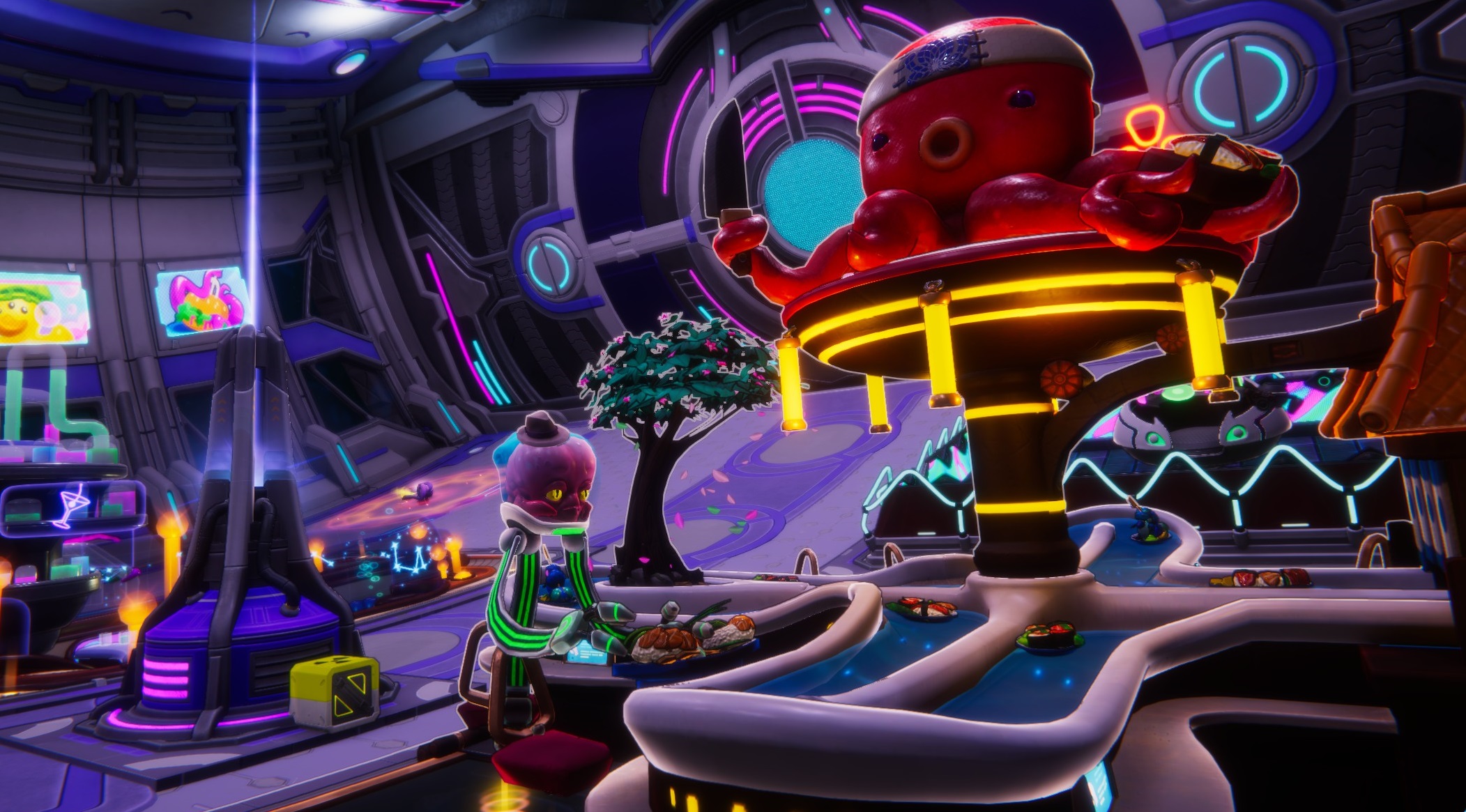Our Verdict
Spacebase Startopia is a missed opportunity to meaningfully build on a classic, but it's still an entertaining management sim.
PC Gamer's got your back
What is it? A spiritual successor to Startopia, a classic space station management sim.
Expect to pay $45/£41.39
Release March 26, 2021
Developer Realmforge Studios
Publisher Kalypso Media
Reviewed on GTX 1080 Ti, Intel i7-8086K, 16GB RAM
Multiplayer? Yes
Link Official site
Spacebase Startopia is an enthusiastic homage to one of my favourite management games. More than an homage, really, as it lifts pretty much everything from the original Startopia, right down to the name—it's more like an unofficial remake. Back in my giant donut-shaped space station, I should finally be content after two decades of waiting, but instead I'm a bit conflicted.
At times the similarities can be so overt that it feels like Startopia with a visual upgrade, but hewing so closely to the original also emphasises the ways in which it misses the mark. Like the terrible, terrible gags.
We got off on the wrong foot, Spacebase Startopia and I, when it introduced me to my relentlessly irritating virtual assistant. Clippy ain't got nothing on VAL, an AI buddy who keeps track of your objectives, drops the occasional suggestion and ceaselessly puts you down. An AI that's also a dickhead is pretty well-trodden territory, but VAL's missing a key ingredient: it just isn't funny. The writing lacks the wit of Glados or even the original Startopia's AI, also called VAL, but the delivery is the real problem. All three voice options sound like they've been run through a text-to-speech programme, making them completely incapable of teasing out chuckles with tone or timing.
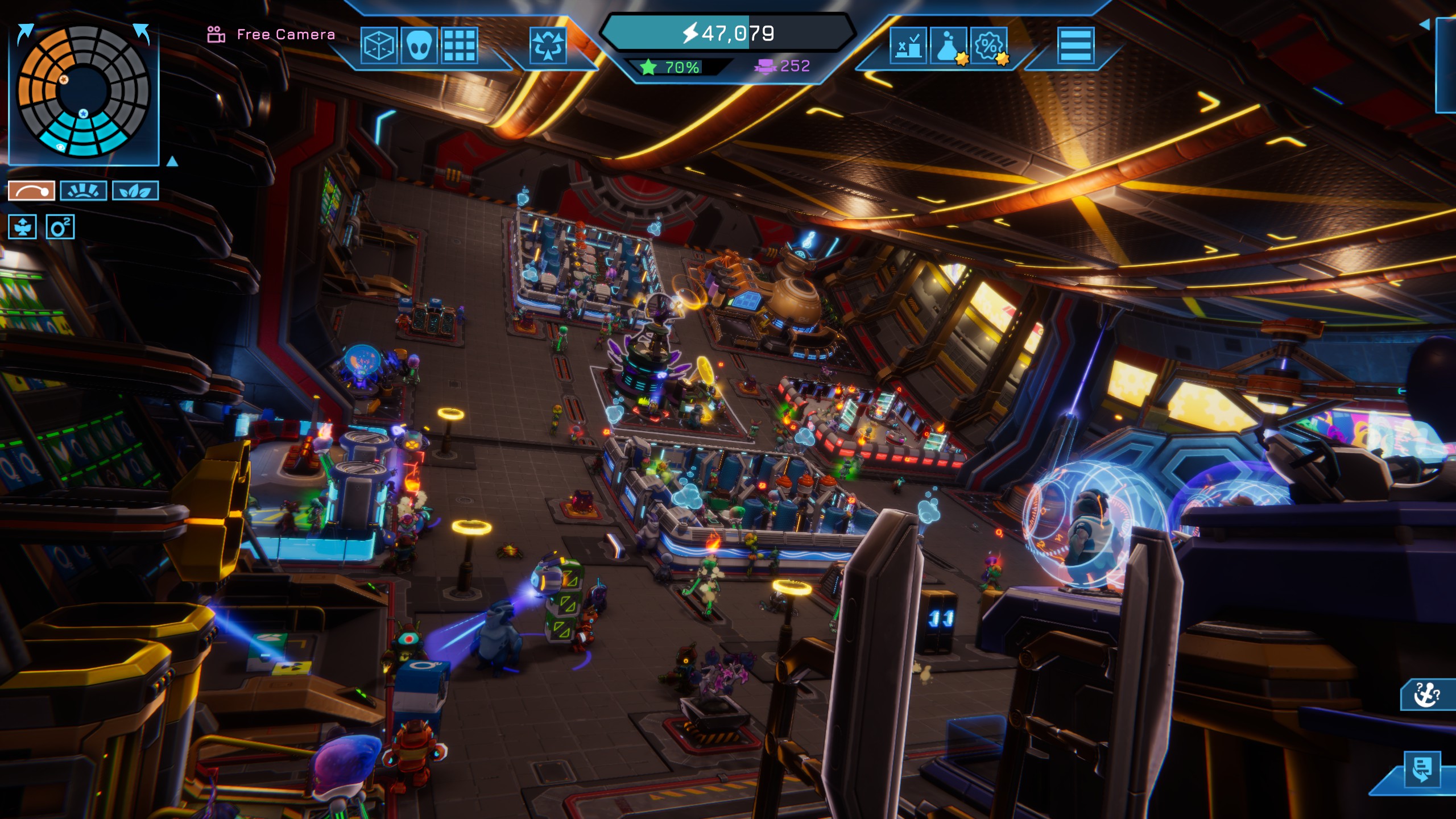
Thankfully, Spacebase Startopia is actually pretty charismatic when you're not being pestered by your assistant or reading pop-ups. You're going to be constantly juggling construction projects, needy visitors, mountains of litter and the occasional death—what I wouldn't give for speed settings or just a pause button—but you should still make some time to set aside your responsibilities just to have a look around. It's a messy hive full of activity where there's always something to stare at, whether it's a visitor sporting a fancy new hat they just won from the loot box lottery—a reference that's already starting to feel dated—or a big group tearing up the dance floor in the disco, busting out different moves depending on their species.
Sometimes I'll follow my diligent little droids around as they travel all over the station delivering crates and cleaning up after the dirty organics. They're cuties. Even the bins have a bit of personality, as they're actually robots who drop off their gross cargo at the recycler once the droids have filled them up. They have very serious faces and I love them.
Rolling in filth
Before you get too excited about recycling, however, I should add that Spacebase Startopia will make you start twitching as soon as you see some litter out in the real world. Dealing with all the rubbish that the station's denizens generate is a monumental task that you will never really complete until you just give up. To stay on top of it, you'll need to give your droids a hand, manually picking it up and depositing it yourself, as well as squashing any of the critters all that filth attracts. Picking up litter was not fun in the original Startopia, and it's so, so much worse in its spiritual successor. I've probably spent more time performing this dismal task than any other single thing in Spacebase Startopia, which is pretty depressing. It does make me appreciate the time I don't spend up to my elbows in grime a lot more, at least.
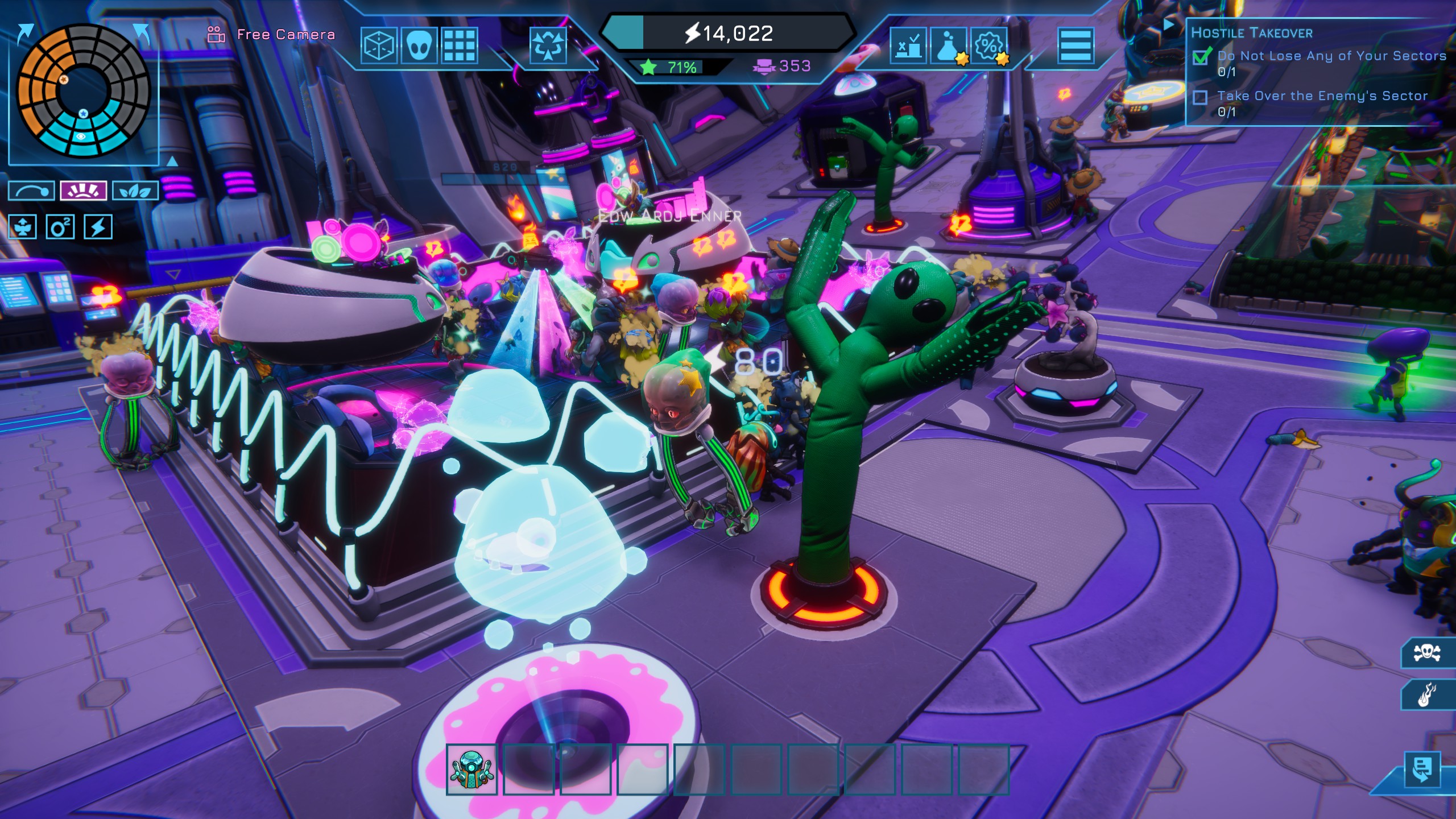
At first glance, Spacebase Startopia looks like pure chaos, with hordes of aliens and robots rushing between rooms heaving with visitors. But it's organised chaos; everyone is working or fulfilling their many needs and vices, each an important link in a sprawling chain that keeps the music pumping in the disco and the factory churning out new blueprints. Hopefully they'll be making you some energy, your primary currency, too. Though the campaign's ten missions each come with distinct objectives, ultimately you're usually still just trying to bring in more visitors and their wallets, earning energy and prestige—a second currency connected to visitor satisfaction—which can then be turned into more rooms and amenities, attracting yet more visitors. In the sandbox mode you're free to do this however you want, but the campaign makes you specialise, teaching you how to run trade hubs, medical stations and great holiday spots.
Regardless of your focus, you'll probably still use everything at your disposal, but the campaign eases you in by slowly unlocking the full list of construction projects, making you wait until you get near the end before you have absolutely everything. This makes some of the earlier missions extremely dull, but later on you'll be thankful you weren't thrown into the deep end. Spacebase Startopia isn't an especially challenging management game, but it can be demanding, dragging you all across the station to make trade deals, oversee research projects and make sure all your facilities are fully staffed.
Once you've got a few toys to play with, the three-level system also proves to be a boon. Every station is split up into sections, separated by bulkheads that can be opened for a fee, and three specialised decks. At the bottom, you've got the main deck, where you'll be spending most of your time. It houses the berth, medical centre, all your industry and security buildings, research—basically a smorgasbord of essential stuff. The second deck is where visitors go to let their tentacles down and take in some entertainment. There are arcades, cat cafes, and even a ride that drops people into a black hole—fun and horror for the whole family. Finally there's the bio deck, where important resources grow, which you can turn into anything from robots to room blueprints. Visitors seeking a bit of peace and quiet also like to hang out here, and you can terraform it to suit different needs or generate specific resources.
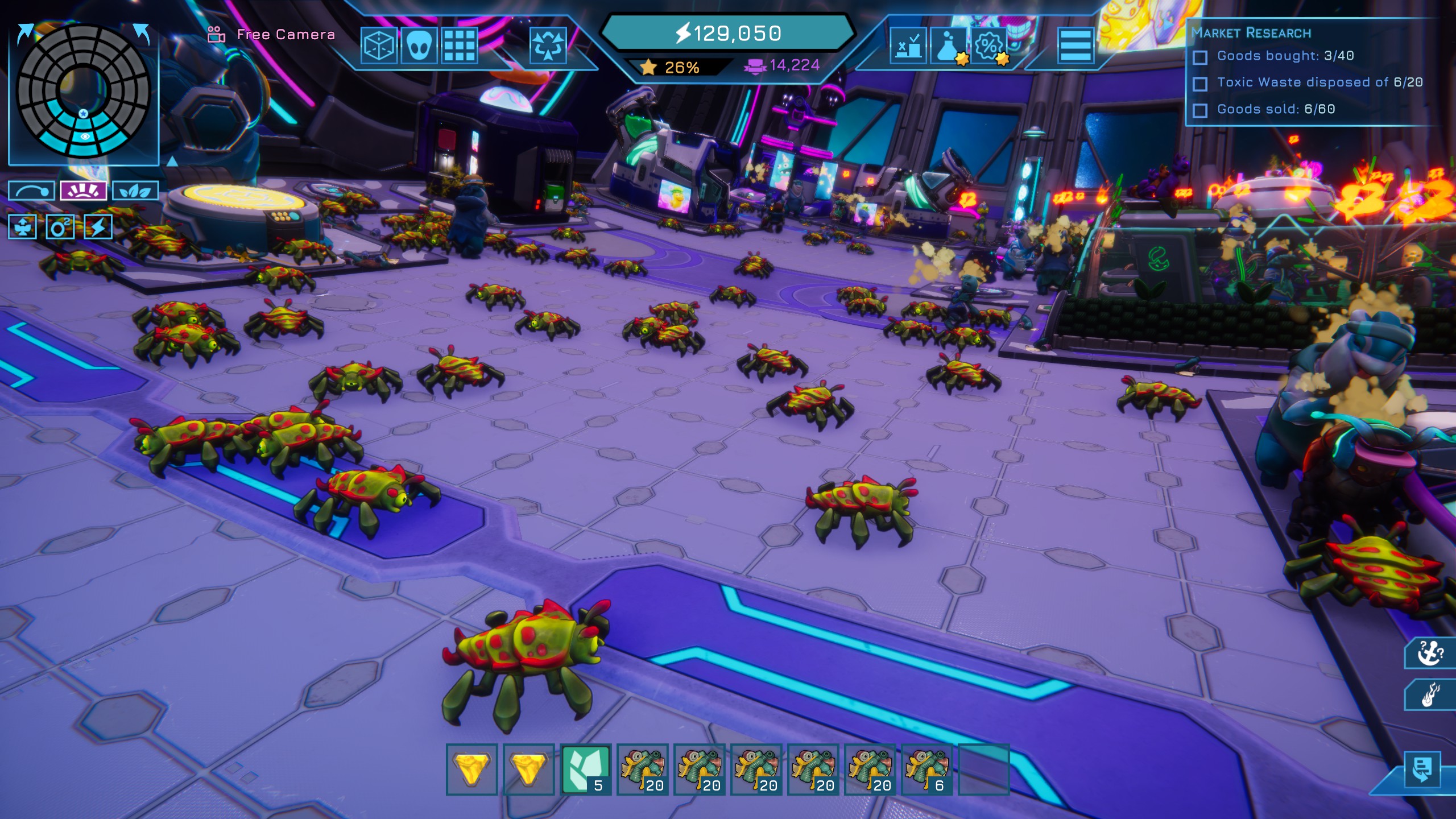
The deck system was one of Startopia's defining features and works just as well here. It splits the vast station up into digestible chunks, and means you're never just staring at the same stuff for hours and hours. It's not just your visitors who benefit from some chillout time in the bio deck. And while the pirate raiders murdering people on one deck won't take a wee break just because you're busy trying to stop everyone from suffocating on another, that bit of distance makes it easier to prioritise and focus.
War is Hell
Speaking of pirate raiders, the fights sure do suck. It doesn't matter if it's pirates or monsters popping out of alien cocoons, combat is the least entertaining aspect of the job. Managing your security droids and mechs—none of your guests or employees will fight—mostly amounts to just clicking on the thing you want to kill… and that's it. Each class of mech also gets one unique ability, but that feels like overkill for encounters this shallow. I also had to rearrange a whole bunch of rooms to give my first mech enough space to move around, so I'm resentful. It's a bit ridiculous having to design a whole space station around something that you'll hardly ever use. I want to like them, and they look awesome—like big, blocky toys—but I'm not a fan.
Getting into a fight also means switching to a different mode, where a combat interface needlessly takes up a third of the screen. In this mode, you can only control your combat units. When a fight breaks out, then, you have to switch mode and tell your units to head to the danger zone, switch back to the regular mode to continue managing the station while they trundle along to their destination, wait for the notification that the attack is underway, and then switch back to combat mode and take over. There's just no need for all this faffing around for an RTS layer that is so basic. Invasions are infrequent, at least, but that just makes it clearer that they should have been cut. There's not really much to salvage.
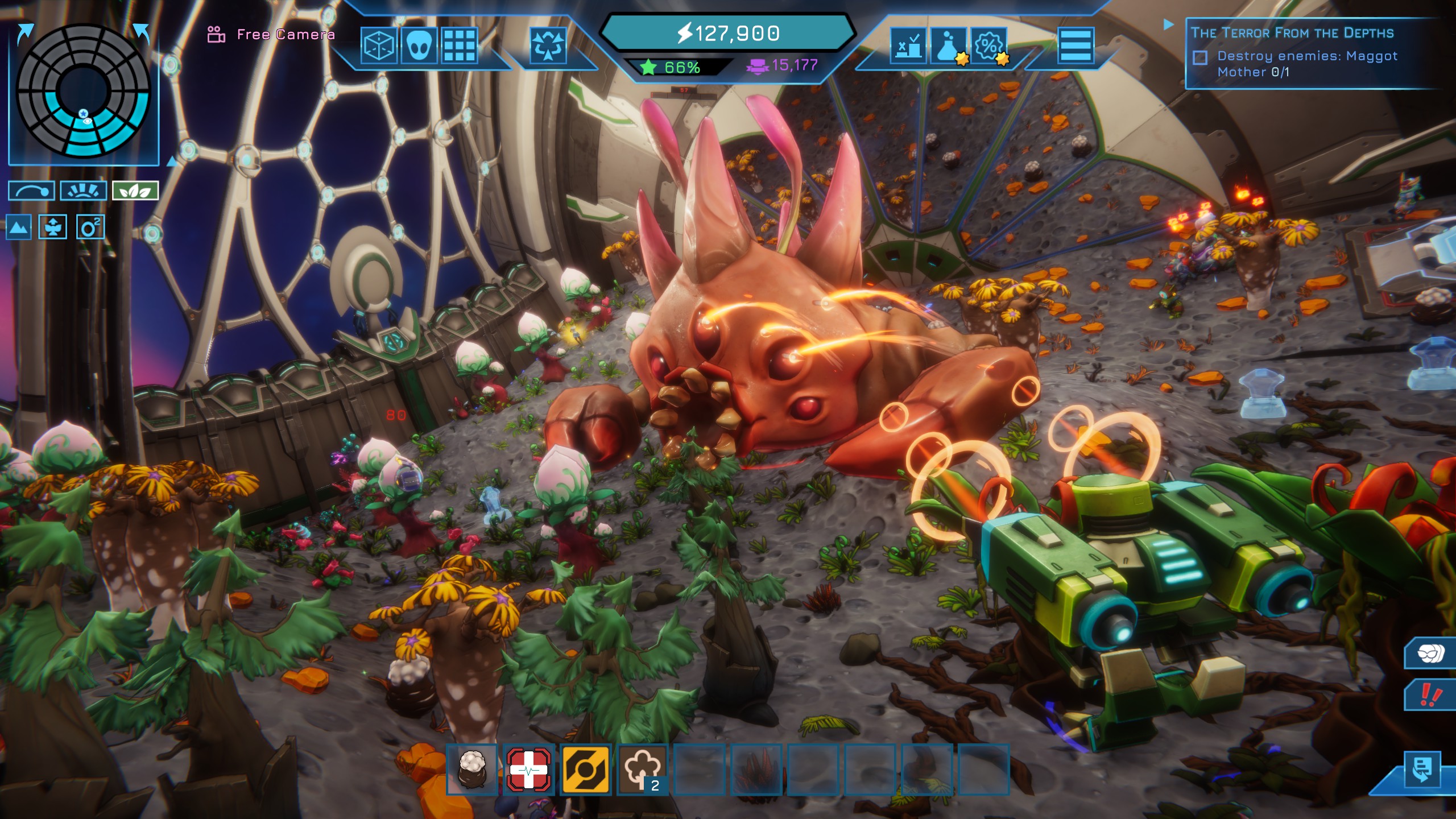
Along with invasions, other random events crop up that offer more compelling management wrinkles. Sometimes you'll be tasked with making a time sensitive choice, for instance, with a range of positive and negative consequences. Some of them give you only bad options, so you have to pick the one you think you can stomach the most, but these events also give you the chance to get some extremely handy buffs. You'll also get offers, like someone asking to offload a bunch of trash for a nice payout, or offering to clean up some of your own trash for a fee. There are lots of ways to get in and out of a jam.
One of these events also taught me a valuable lesson: maybe it's OK to let a plague take root in your station if you're also in the business of curing people. There aren't many opportunities to be horribly ruthless, but this is a big one. I have some regrets about my behaviour and some aliens to apologise to.
I wish there was more of that: tough choices and corruption. The cartoon capitalism of Spacebase Startopia feels like fertile ground for these kinds of shenanigans, but they are so rare. While it does tend to be at its best when it sticks as closely as possible to its predecessor, it's still a shame that it's so reliant on a single game. Maybe I should be glad there aren't more misses like the new RTS layer, but management games have developed a lot over the last two decades, offering so many ways to build on Startopia instead of replicating it. I guess living in the past isn't such a good thing after all. But it can be fun to visit for a few days.
Spacebase Startopia is a missed opportunity to meaningfully build on a classic, but it's still an entertaining management sim.

Fraser is the UK online editor and has actually met The Internet in person. With over a decade of experience, he's been around the block a few times, serving as a freelancer, news editor and prolific reviewer. Strategy games have been a 30-year-long obsession, from tiny RTSs to sprawling political sims, and he never turns down the chance to rave about Total War or Crusader Kings. He's also been known to set up shop in the latest MMO and likes to wind down with an endlessly deep, systemic RPG. These days, when he's not editing, he can usually be found writing features that are 1,000 words too long or talking about his dog.
